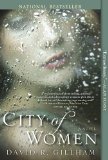Summary | Excerpt | Reading Guide | Reviews | Beyond the Book | Readalikes | Genres & Themes | Author Bio

A Novel
by David R. GillhamONE
THE BLIND MAN TAPS his cane rhythmically. Three taps, three taps, three taps to gain the attention of passing Berliners. He is a cadaverous sentry with a shaved pate under an old soldier's cap, selling pencils from a canister strung about his neck. A pyramid of dots is stamped onto the armband he wears, and his round black goggles are like two holes poked through the day, letting the night bleed through. Sigrid fishes out the coin purse from her bag as she emerges from the U-Bahn stairwell, and drops a few groschen into his cup. "Bless you," he rasps in answer to the jangle. "Please choose a pencil." She thanks him, but when he turns his head in the direction of her voice, something behind the blindness of those goggles seems to mark her. She puts the pencil into her handbag and crosses the street at the signal.
Tickets for the matinee are three and a half marks now. Up fifty pfennigs. But Sigrid pays the increase without complaint. Today's feature is titled Soldiers of Tomorrow. The poster casement displays eager, towheaded boys in soldierly Hitler- Jugend outfits, charging across a field with wooden rifles, practicing gymnastics, or peering down the barrel of a heavy- caliber machine gun, under the smiling instruction of an army officer. But what's playing makes no difference. She's not here to see a film.
Inside, the usual wartime patrons greet her ticket purchase with vacant appraisal. The lobby smells of mildew and unswept rugs, and the once- grand chandelier lighting is dim and spotty with missing filaments. The sweets counter is empty. Nothing to sell, like the rest of the town. The coat- check porter is reading a sporting magazine to ease his boredom, since the heating is poor, and the weather is far too raw for anyone to shed their overcoats. But there's a crowd waiting for the ushers to open the doors to the auditorium. In a city where the food is bad and getting worse, where rationing has emptied the shop windows, in a city slowly suffocating on the gritty effluence of another year of war, movie houses are still places to spend a few marks without cutting coupons from a ration book, or waiting one's life away in a queue.
Ashen- faced pensioners are bent over their canes. Factory women between shifts, with their hair tied up in turbans, pass a single cigarette among themselves. Hard- eyed street whores are on the lookout for takers among the off- duty soldiers. Hausfrauen clutch their heavy purses on their laps, and wait patiently, relieved to escape their children and the duties of home for a few hours.
To all the patrons, Sigrid Schröder speaks only silence.
She is a stenographer in the applications department of the Gitschiner Strasse Patent Office near the Belle Alliance Platz. Still with her looks, she likes to think. Her hair is still thick and flaxen, underneath the scarf she ties over her head. Her body still strong and favorably proportioned. She is not displeased when she looks in the mirror, she simply seldom bothers to. The years of war have redefined her in very restricted terms. She is a number on a pay book, on a booklet of rationing coupons, a face on an identity card. She is Frau Schröder, a kriegsfrau. The wife of a frontline soldier. Her name is merely something to which she answers.
Following the pattern of the threadbare runner, she mounts the stairs to the mezzanine, which overlooks the horseshoe shape of the central auditorium. Sometimes the whores escort their customers up there for their transactions. It's more private, and the ushers never seem to mind. They're likely hoping for a tip. Sigrid has learned to pay them no heed. She, too, counts on the balcony's sparse population during matinees.
Discovering that the old uncle in the usher's uniform has found a spot for a nap in a seat by the door, she ignores the number on her ticket and takes a seat in the last row against the wall. This is the seat of her memory.
Excerpted from City of Women by David R Gillham. Copyright © 2012 by David R Gillham. Excerpted by permission of Amy Einhorn Books. All rights reserved. No part of this excerpt may be reproduced or reprinted without permission in writing from the publisher.
When an old man dies, a library burns to the ground.
Click Here to find out who said this, as well as discovering other famous literary quotes!
Your guide toexceptional books
BookBrowse seeks out and recommends the best in contemporary fiction and nonfiction—books that not only engage and entertain but also deepen our understanding of ourselves and the world around us.